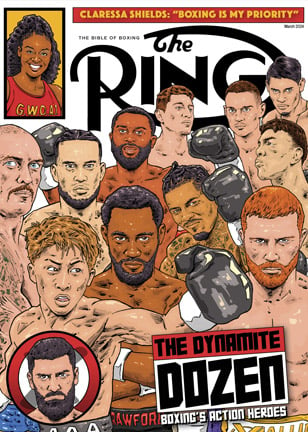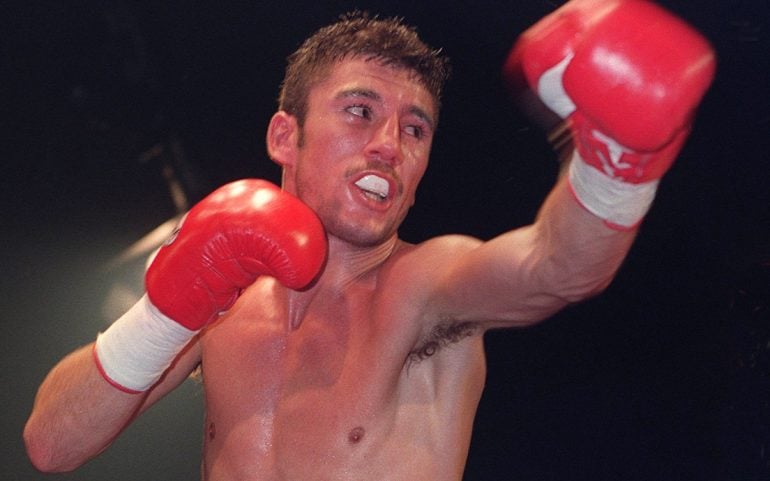
Greatest Hits: Wayne McCullough
Above: Belfast, 1995, McCullough in action during the first defense of his WBC bantamweight title against Johnny Bredahl, who succumbed in the eighth round. (Photo by Mike Cooper/AllSport via Getty Images)
From the tough streets of Belfast to winning silver at the 1992 Olympics Games in Barcelona to world title glory in Nagoya to living in Las Vegas – it’s been a wild ride. Iron-jawed pressure-fighter Wayne McCullough more than lived up to his “Pocket Rocket” moniker during his decade-plus at the top of the sport.
McCullough, who was the fifth of seven children, was born in a notoriously tough part of Northern Ireland’s capital on July 7, 1970.
“I was born on Shankill Road, a real Protestant area. My parents were unemployed,” McCullough told The Ring. “My area is what they call the ghetto here. You were safe in that area, though, unless you did something wrong.
“[I saw a] lot of punishment shootings. I seen stuff as a young kid that I can’t even talk about today.”
His boxing journey began when he had his first fight at 8 years old.
“My two older brothers got trophies, so I wanted one,” he said. “Boxing became natural to me. It kept me off the streets. Most of my friends got into trouble, shot or locked up.”
As an amateur domestically, he thrived, winning All-Ireland titles in various age groups – Juvenile, Youth, Under-18 and Junior – and as a senior, he was a three-time national champion (in separate weight classes).
“Boxing became natural to me. It kept me off the streets.”
As a teenager competing at junior flyweight, McCullough represented Northern Ireland at the 1988 Seoul Olympics, losing to Canadian Scotty Olson. However, as the youngest member of the team, he received the honor of carrying his nation’s flag.
McCullough won gold at the Commonwealth Games in Auckland, New Zealand, in early 1990 and later that year he earned bronze at the World Cup. He gained further experience at the 1991 World Championships in Sydney, losing at the quarterfinals stage.
Now a more seasoned and mature fighter, McCullough headed to the 1992 Barcelona Olympics with the very realistic aim of bringing back a medal.
The proud Irishman won his first three fights without a problem and was then matched with world No. 3-rated Li Gwang-sik, of North Korea, in the bantamweight semifinal. The result was an all-out war that ended 21-16 in favor of McCullough.
“I emerged victorious despite a broken cheekbone and a facial nerve injury,” he said. “This fight highlighted the resilience required at the top level and reinforced my determination to become a professional fighter. Some said this fight was the best fight of the entire Olympic Games.”
While lesser men may have pulled out ahead of the final with Joel Casamayor, that’s not who McCullough is.
“I remember after the first round against Casamayor, I thought I was up [on the scorecards],” he said. “You could see scores between rounds. If you watch, you will see me do a double-take looking at scores. Our Cuban coach told me to forget about scores. I was 6-1 down.
“The next round, Joel finished off my cheekbone and nerve. I had blood coming out of [the] corner of [my] eye from damage under [my] cheek. I’ve never experienced pain like it in my life in a ring. I went out and won [the] last round.”
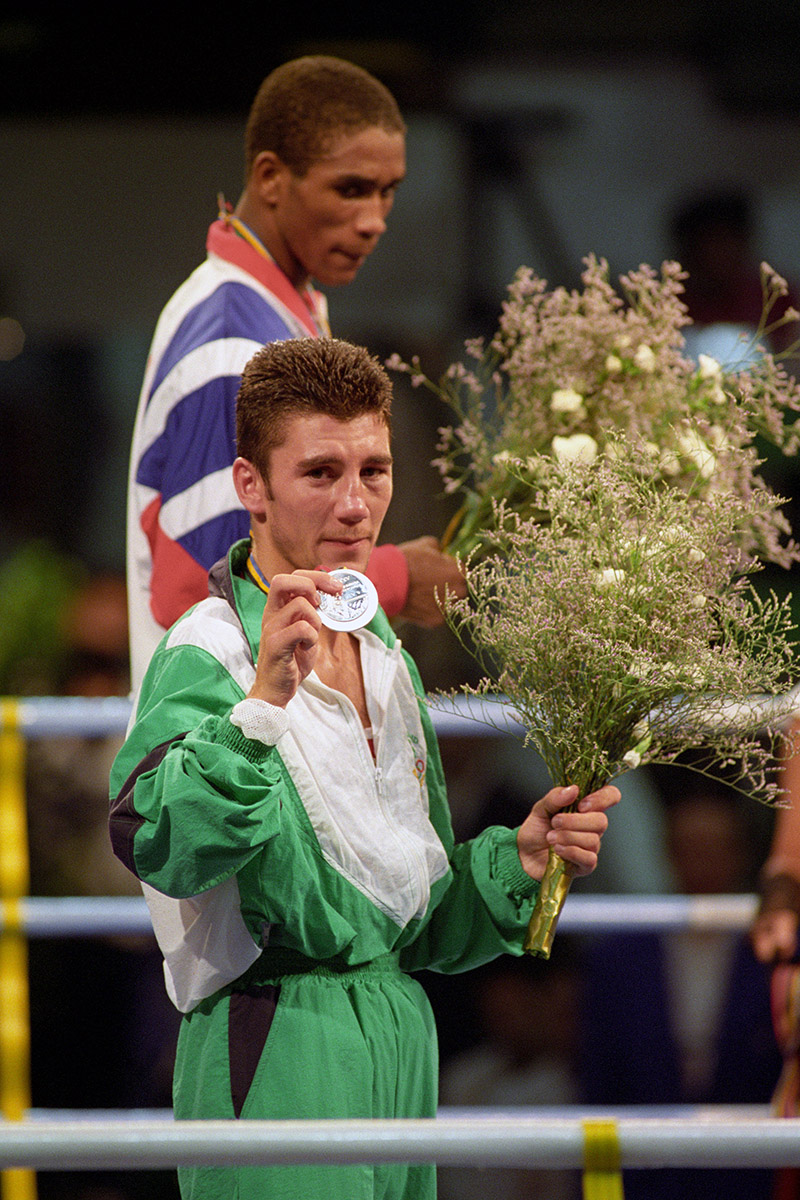
McCullough raises his Olympic silver medal beside future two-division titleholder Joel Casamayor. (Photo by PA Images via Getty Images)
Ultimately, it was too much of a deficit and McCullough dropped a 14-8 decision to the preternaturally talented Cuban, who later won world titles in two weight classes.
McCullough, who went 308-11 (100 knockouts) in the unpaid ranks, decided it was the right time to move into the professional side of the sport.
“I waited over four months before I was allowed to get hit again, six months after the Olympics before fighting,” he said. “So, I had time to take in the offers and not rush things.
“Barney Eastwood (an Irish promoter) made offers. I trained at his gym and always wanted to stay home. So I thought, ‘Great.’ But the offer was terrible.
“[Matt] Tinley (an American manager) made a good offer and came on board around November that year. He met me in Dublin with Barry McGuigan. But I wasn’t going to fight until [the following] February.”
After sorting out his representation, the next part of the jigsaw was the corner. The legendary Eddie Futch agreeing to become McCullough’s trainer was pivotal.
“From the beginning of my career, he was the reason I was based in Las Vegas; his base was here then,” explained McCullough. “He saw me at the Olympics in ’92. He was going to retire after [Riddick] Bowe and [Mike] McCallum.
“Tinley asked him if he was interested, and he said yes. He saw something in me. He had Freddie Roach, who left the week I got here, Thell Torrance [and] Hedgemon Lewis as his assistants.
“He was strict, which is good. He cared about me as a person. Always did the right things. He was a great coach, a great man, beautiful man. He had personality and was caring. Every second with him was priceless.”
The two struck up an instant rapport that became a close friendship lasting until Futch’s death in 2001.
With everything in place, McCullough began his professional career at the Country Club in Reseda, California, in February 1993.
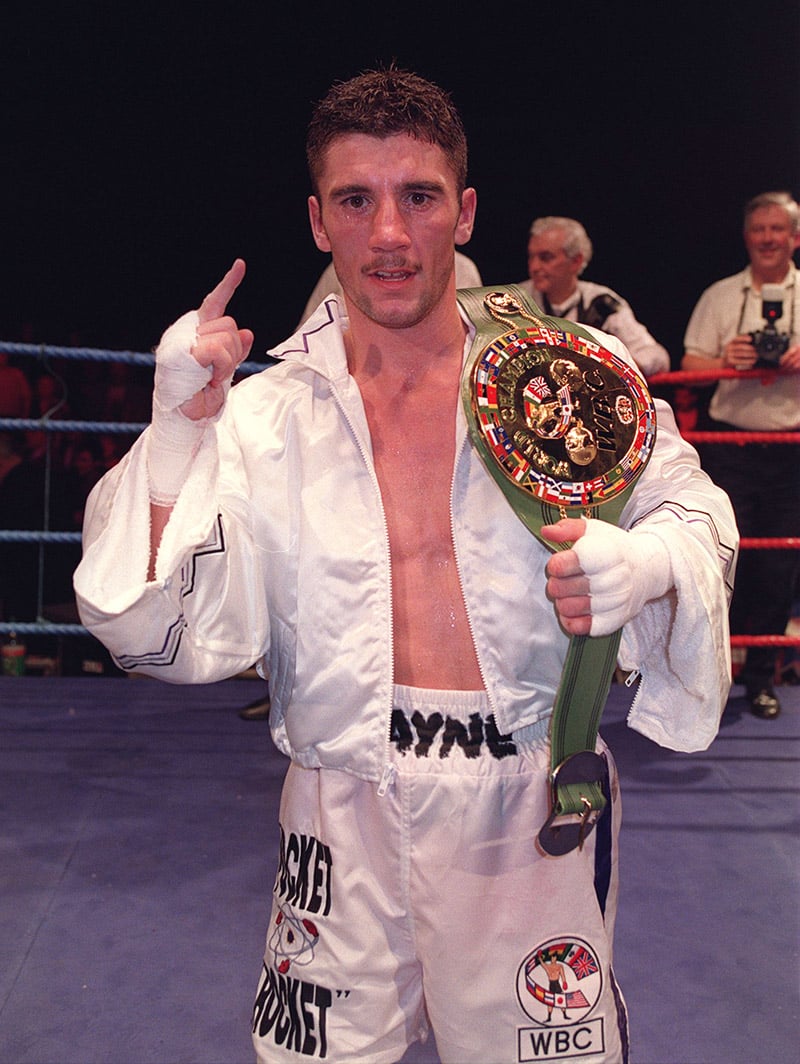
McCullough won the WBC bantamweight title in 1995. (Photo by Mike Cooper/AllSport via Getty Images)
“My first professional bout against Alfonso Zamora (not the bantamweight champion of the same name) proved I was ready for the pro game,” he said. “Overcoming the initial concern of the cheekbone injury and using smaller pro fight gloves for the first time in my career, I secured a stoppage win in the fourth round, demonstrating my ability to handle the pressure of professional boxing.”
McCullough fought 10 times in 1993, including an appearance in Belfast, ending the busy year at the 10-round level. His final fight of the year was a stoppage of savvy veteran Jerome Coffee (TKO 5) on the undercard of rising superstar Roy Jones Jr. vs. Fermin Chirino in Pensacola, Florida.
That win prompted McCullough’s handlers to sanction a fight for the vacant NABF bantamweight title in Omaha, Nebraska, in early 1994.
“I was battling an undefeated opponent, Javier Medina, in freezing weather outside the arena,” he recalled. “I clinched the NABF belt, propelling me into the WBC’s top 10. Despite my opponent’s pre-fight antics, I maintained composure, dominating every round, dropping him on the way to securing a decisive seventh-round stoppage.”
The all-action Irishman, the type of fighter who can make shadowboxing exciting, gained further experience against former titleholders Victor Rabanales (UD 12) and Fabrice Benichou (PTS 10).
In the summer of 1995, McCullough claimed the WBC bantamweight title with a thrilling win over Yusuei Yakushiji (SD 12) in Japan. Two defenses followed – one in Belfast and the other in Dublin – before weight issues saw him move to junior featherweight, where he lost a razor-thin decision to WBC titlist Daniel Zaragoza (SD 12). He came up short on big nights against Naseem Hamed (UD 12) and Erik Morales (UD 12) but always looked to challenge himself and face the best.
Then, as he began his post-Morales comeback at the start of the 21st century, McCullough received life-changing news that had huge ramifications for the next couple of years.
“I think I was supposed to fight some guy from Europe,” he recalled. “I was told the fight was off by the promoter of the fight. He called a few times that day, telling me to go to his gym. I was tired. My weight was down and I just wanted to go back to my place and eat and go to bed to get ready for the weigh-in the next day. He called again, so I drove there on the way to my place. My wife got out of the car and went into the gym to see what he wanted. They came out together quickly and their faces looked like there was something wrong. I was told that I couldn’t fight that week, my career was over and one punch to the head could kill me. I was stunned.”
Supposedly, an MRI performed six days earlier at a pre-fight medical exam and then turned over to BBBofC doctors had detected an irregularity. His promoter advised him to seek a second opinion.
“I was told that I couldn’t fight that week, my career was over and one punch to the head could kill me.”
“I hadn’t seen any reports from any doctor,” McCullough said. “So, the day of the weigh-in, I went to Dublin early that day. I saw a neurosurgeon, who got together with two more, and they said there was nothing there. We drove back, arrived at the weigh-in and gave reports to the doctor in charge at the weigh-in from the BBBofC. He was just a regular doctor, so said he couldn’t look at them. They actually let me weigh in and called my opponent to weigh in. We went with the doctor to the hospital, who took a scan. He wasn’t a neurosurgeon; he was a radiologist. He said he saw something and then sent it on to London for the BBBofC top doctor to look at.
“The Nevada Athletic Commission sent me to UCLA. Marc Ratner was the top guy then here in Vegas on the commission. He called me in Belfast and asked if I was OK. BBBofC never did. I went to a top doctor in the country at UCLA, Los Angeles. He received scans, and first thing he said was, ‘Whoever said you was going to die with a blow to the head needed their head looked at.’ He got together with three other doctors in the U.S. Top guys. And they got together and looked through everything. A scan from ’93 took in the same hospital in Belfast at the start of my career, too. They saw a space but not a cyst. The ’93 scan was the same as the 2000 – no changes in anything.”
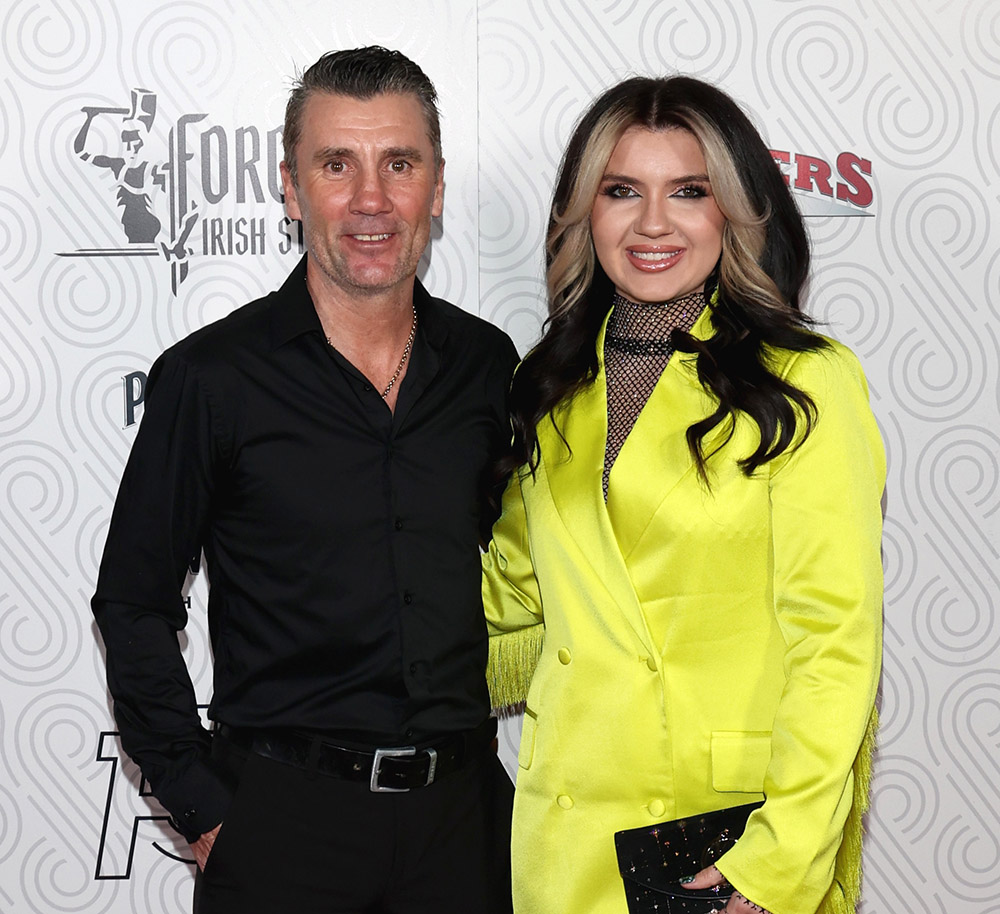
McCullough and his daughter Wynona, aka Wy Mac, at the Fighters Only World Mixed Martial Arts Awards in Las Vegas in 2023. (Photo by Gabe Ginsberg/Getty Images)
McCullough was cleared in early 2002 and soon after signed with Frank Warren, who put him in with WBO featherweight beltholder Scott Harrison the following year. Harrison proved to be too big and too young, winning a wide 12-round unanimous decision.
After a period on the sidelines, McCullough returned at junior featherweight, where he twice fought WBC champion Oscar Larios, dropping a spirited 12-round unanimous decision and then suffering the first stoppage of his career when his corner retired him after 10 rounds. He fought once more, a losing effort against Juan Ruiz (RTD 6).
“It’s always tough leaving the ring as a fighter. We think the only thing we can do is fight,” said McCullough (27-7, 18 knockouts). “It’s good to leave the ring after lots of fights with your brain still working and speech understandable.”
In retirement, McCullough has worked as a trainer for, among others, Alex Arthur, Librado Andrade, Enrique Ornelas and Francisco Santana, and he is currently working with Jamel Herring.
McCullough, 53, still lives in Las Vegas with his wife, Cheryl, of 31 years. The couple has a daughter, Wynona, who has followed her father into entertainment, though makes her living as a singer under the name of Wy Mac. She has put out two albums, performed with Irish pop group Westlife, and has frequently rocked the national anthem at major sports events in Las Vegas.
McCullough enjoyed looking back at his boxing journey and reminiscing about six career-defining performances for the readers of The Ring.
VICTOR RABANALES
June 17, 1994, Trump Taj Mahal, Atlantic City • Titles: NABF bantamweight
“Faced with the number one contender after my success against Javier Medina, this fight was a true test of my skills. He was the guy I had to beat to get a crack at the belt I wanted, the WBC. He was 31, I was 23. He had 51 fights. He’d just lost the belt. It was my 13th fight. So he had more knockout wins than I had fights.
“He had metal teeth! He was so unorthodox. Long arms, slightly shorter than me, but would throw an uppercut that would turn into an overhand shot. I said this in my book about it: We all knew it was going to be a tough fight. About a minute into the ninth round, Rabanales threw what looked like a body shot, but instead he brought it up over the top and hit me, full force, with a solid right hand that landed directly on the center of my face. The punch knocked my head right back. On television, it looked as if my head might be ripped off my shoulders. That punch would have knocked anybody else out. But not me.
“For what seemed like five seconds – it was probably more like a thousandth of a second – I thought I was sitting on the sofa watching TV in my hotel room with Cheryl. I imagine it’s what being out on your feet must feel like. But my legs stayed strong. To this day, no other fighter has ever hurt me like that. When I was coming around again, everything was black with white flashing lights. My vision was fuzzy and I couldn’t see straight. I saw three Rabanaleses and didn’t know what to do, so I hit the one in the middle! On instinct, I continued to throw punches and move around the ring. I stepped back again and nodded to him, acknowledging he had hit me.
“In training, we focused more on boxing with a good jab. I did use the jab but stood in front of him more instead of moving! I moved in the last two rounds and made it easier for myself. Eddie was right about boxing behind the jab. I think it was inexperience as a pro against the number one guy, who clearly had more experience than me.
“Despite losing rounds for the first time in my professional career and sustaining facial bruising, I secured a unanimous points win, solidifying my position as the number one contender and reaffirming my determination to become a world champion. After that fight, I told my wife that professional boxing is a tough game, but I’m going to be a world champion.”
Result: McCullough UD 12
YUSUEI YAKUSHIJI
July 30, 1995, Aichi Prefectural Gym, Nagoya, Japan • Titles: WBC bantamweight
“We had training camp in Las Vegas, then went to Utah, then one week in Hawaii, then we got to Japan one week before the fight. Eddie planned everything perfectly.
“Against the odds, I ventured to Japan to challenge Yasuei Yakushiji for the WBC world title. He was making the fifth defense of his belt. I was unaware, going into this fight, that no fighter had ever successfully gone to Japan from Ireland or the U.K. and brought a world title back. The odds were stacked against me.
“Different custom. The Japanese people were respectful. The streets were so clean. The hotel was top-class and we had the right food and drinks for me. My door was banged two nights in a row, probably Yakashiji’s people trying to scare me. I’m from Belfast. (laughs) First night the door was banged, I got up and looked out. The second night, I stayed in bed.
“My legendary coach, Eddie Futch, had created the perfect game plan during training so that I would peak at the perfect time. He had me jabbing at different angles even though the champion’s best weapon was his jab. At fight time, in the dressing room, Eddie said, ‘I want you to jab.’ I was so confused, because I knew Yakushiji had a good jab. I went out, started landing my jab to the body and head at different angles. The game plan worked perfectly, and I secured a split decision, making history as the first fighter from the U.K. and Ireland to win a title in Japan, as well as Ireland’s first WBC champion.
“There was probably a total of 20 people who traveled to support me. Expenses are covered by the manager, usually. I was hit with a $125,000 bill and my manager still took 25 percent of my purse. He brought his wife and family. In the ring, you see his kid with me. I paid for that! I made around $575,000. After everything, including my taxes cleared, I made around $180,000.
“The fight was at lunchtime. We had a party in the hotel the night of the fight.”
Result: McCullough SD 12
JOSE LUIS BUENO
March 30, 1996, The Point, Dublin, Ireland • Titles: WBC bantamweight
“We stayed in Luttrellstown Castle in Dublin for two weeks. We had everything set up for training in it. Again Tinley brought family members for a vacation while I was starving to death. The bill wasn’t paid for the castle. I was hit for it. He finally paid for some of it.
“Bueno was tough. More knockouts than wins I had. I had problems getting the last pound off. I killed myself doing it and could hardly walk or open my eyes going to the scales. I made it but was drained. The truth is I didn’t know how to make weight. It was the old school: Train, sweat and starve yourself. I should’ve learned how to make weight properly and I would’ve kept defending my belt. I learned how to do it in 2000. I went back to school for two years, learning sports nutrition. I could make bantamweight today.
“This is the one I don’t remember from the second round [onward]. I prayed to God on the stool to get me through it. That was all I remember until the next day. Bono was in the dressing room. He gave me his sunglasses [though I don’t remember it]. I was told Bueno didn’t make his flight, as he was busted up too.”
Result: McCullough SD 12
DANIEL ZARAGOZA
January 11, 1997, Hynes Convention Center, Boston, Massachusetts • Titles: WBC junior featherweight
“I had the perfect camp up in Colorado, high altitude, over Christmas and New Year, running in the snow.
“[New England] Patriots owner Robert Kraft came to my press conference and gave me a Patriots jersey with my name on back and cap. I was a football fan – our football, Liverpool – but I became a Patriots fan.
“I watched that fight over and over, and I won clearly seven, maybe eight rounds. The last two rounds, I went through him. Give me the old 15 rounds! Eddie, until the day he died, said I won. He always spoke the truth. Hard taking [my] first loss, but I thought ‘automatic rematch.’”
Result: Zaragoza SD 12
NASEEM HAMED
October 31, 1998, Convention Center, Atlantic City, New Jersey • Titles: WBO featherweight
“I fought Juan Polo Perez in one of my comeback fights. I was going through manager problems and my head wasn’t in the Perez fight. I won, looked like crap, and my manager never even turned up for it. Hamed knocked Perez out quickly. A few days after my fight, my wife got the call. I said yes without seeing any contracts. I wanted the fight for a while. He never would’ve fought me, only for this Perez fight.
“On the press tour two months before in New York, I turned up with coach Kenny Croom. My manager didn’t turn up. Hamed predicted what he was going to do to me. I stood up and told the media why they thought what he said he was going to do to me, why they believed it. I remember the round he said he was going to stop me – 2:32 of Round 3. He named the minutes and seconds. I never was rocked in a fight, just stunned by Rabanales. I knew the 18 guys he knocked out before me. I knew I was better and still only 28. He said to me face-to-face that he was going to knock me out. My wife told me, ‘Don’t get into an argument.’ I just looked at him in the eyes and said, ‘As soon as you hit me, you will run.’ That’s what he did.
“He turned to my fans [during the ring entrance] and changed his route. It was quick after the organ playing. Cool entrance. I had Michael Flatley walk me to the ring. [Barry] McGuigan and Daniel Day-Lewis called me before the fight. Bono sent me a sketch.
“I landed a left hook at the side of his head and his glove hit the canvas in the second round; the ref did nothing. He pulled me to the floor and hit me on the ground – nothing from the ref. I wanted to get close, which I did. As soon as I was in close, the ref broke us. He did look bad, because Eddie Futch gave Kenny Croom the game plan. He was 88 and not able to travel. He said make Hamed move to his left so he can’t get the power right hook going.
“I knew the punch-stat guys. They said he threw two more punches than me. I went back to count them. Of course they lied. I paid them for one of the rounds to check. They came back with 20 more punches I threw in one of the rounds. Crazy. The fight’s over. It [don’t] matter.
“Listen to Jim Lampley calling clear shots that I rolled landing. I knew I was fighting the corporate. [Hamed] signed a [multi-]million dollar deal before my fight with HBO. I have Frank Warren on Sky footage after the fight saying there would be a rematch. Hamed left Warren and Ingle after my fight.”
Result: Hamed UD 12
ERIK MORALES
October 22, 1999, Joe Louis Arena, Detroit, Michigan • Titles: WBC junior featherweight
“The fight was scheduled for May ’99 here in Las Vegas as the main event, but I got injured. The fight then was the co-main to Naseem Hamed vs. Cesar Soto in Detroit.
“Dropping down in weight was easy. I knew how tough he was but also remember his fight with Zaragoza was close until the late stoppage. He said he was going to knock me out, do what Hamed couldn’t. That didn’t even come close. I love this fight. He hit hard for 12 rounds but couldn’t take the pressure.
“I stayed as [the WBC] number one contender after this, as he moved up after his next fight with [Marco Antonio] Barrera.”
Result: Morales UD 12

READ “Best I Faced: Wayne McCullough” on RingTV.com
Questions and/or comments can be sent to Anson at [email protected].

